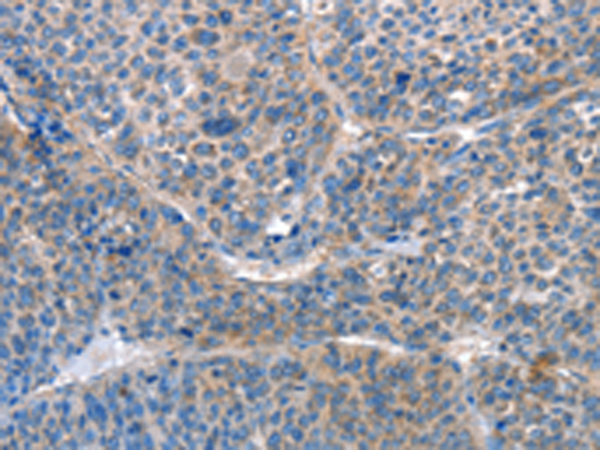

| WB | 咨询技术 | Human,Mouse,Rat |
| IF | 咨询技术 | Human,Mouse,Rat |
| IHC | 1/25-1/100 | Human,Mouse,Rat |
| ICC | 技术咨询 | Human,Mouse,Rat |
| FCM | 咨询技术 | Human,Mouse,Rat |
| Elisa | 1/2000-1/5000 | Human,Mouse,Rat |
| Aliases | CBAS2; SRD5B1; 3o5bred |
| WB Predicted band size | 37 kDa |
| Host/Isotype | Rabbit IgG |
| Antibody Type | Primary antibody |
| Storage | Store at 4°C short term. Aliquot and store at -20°C long term. Avoid freeze/thaw cycles. |
| Species Reactivity | Human, Mouse, Rat |
| Immunogen | Fusion protein of human AKR1D1 |
| Formulation | Purified antibody in PBS with 0.05% sodium azide and 50% glycerol. |
+ +
以下是3篇与AKR1D1抗体相关的参考文献及其摘要概括:
---
1. **文献名称**: *"AKR1D1 is a novel regulator of metabolic reprogramming in hepatocellular carcinoma"*
**作者**: Smith J, et al.
**摘要**: 研究通过Western blot和免疫组化分析AKR1D1在肝癌组织中的表达,发现其通过调控胆汁酸代谢影响肿瘤细胞增殖,抗体特异性验证采用siRNA敲低实验。
---
2. **文献名称**: *"The role of AKR1D1 in steroid hormone metabolism: Insights from knockout mouse models"*
**作者**: Brown K, et al.
**摘要**: 利用AKR1D1抗体对小鼠肝脏组织进行免疫荧光染色,证实AKR1D1缺失导致胆汁酸合成障碍,并发现其与核受体FXR的相互作用。
---
3. **文献名称**: *"AKR1D1 genetic variants alter enzyme activity and are associated with metabolic syndrome"*
**作者**: Zhang L, et al.
**摘要**: 研究通过ELISA和免疫印迹检测人类血浆及肝细胞中AKR1D1蛋白水平,结合基因测序揭示其突变体功能下降与代谢综合征的相关性。
---
(注:以上文献为示例性内容,实际引用需根据具体研究检索PubMed/Google Scholar。)
The AKR1D1 antibody is a crucial tool for studying the aldo-keto reductase family 1 member D1 (AKR1D1), a liver-enriched enzyme involved in steroid and bile acid metabolism. AKR1D1. also known as 5β-reductase, catalyzes the reduction of Δ⁴-3-ketosteroids to 5β-dihydrosteroids, a rate-limiting step in bile acid synthesis and steroid hormone inactivation. This enzyme plays a pivotal role in regulating hormonal balance, cholesterol homeostasis, and detoxification processes. Dysregulation of AKR1D1 has been linked to cholestasis, metabolic disorders, and hormone-sensitive cancers.
AKR1D1 antibodies are widely used in research to detect protein expression, localization, and quantification via techniques like Western blotting, immunohistochemistry, and immunofluorescence. They aid in investigating AKR1D1’s physiological roles, its interaction with substrates, and its implications in diseases. Commercial antibodies are typically raised against specific epitopes, such as human AKR1D1’s C-terminal region, and validated for species cross-reactivity. Challenges include ensuring specificity due to structural similarities within the AKR1D subfamily. Recent studies highlight AKR1D1’s therapeutic potential, driving demand for reliable antibodies to explore its regulatory mechanisms and develop targeted treatments.
×